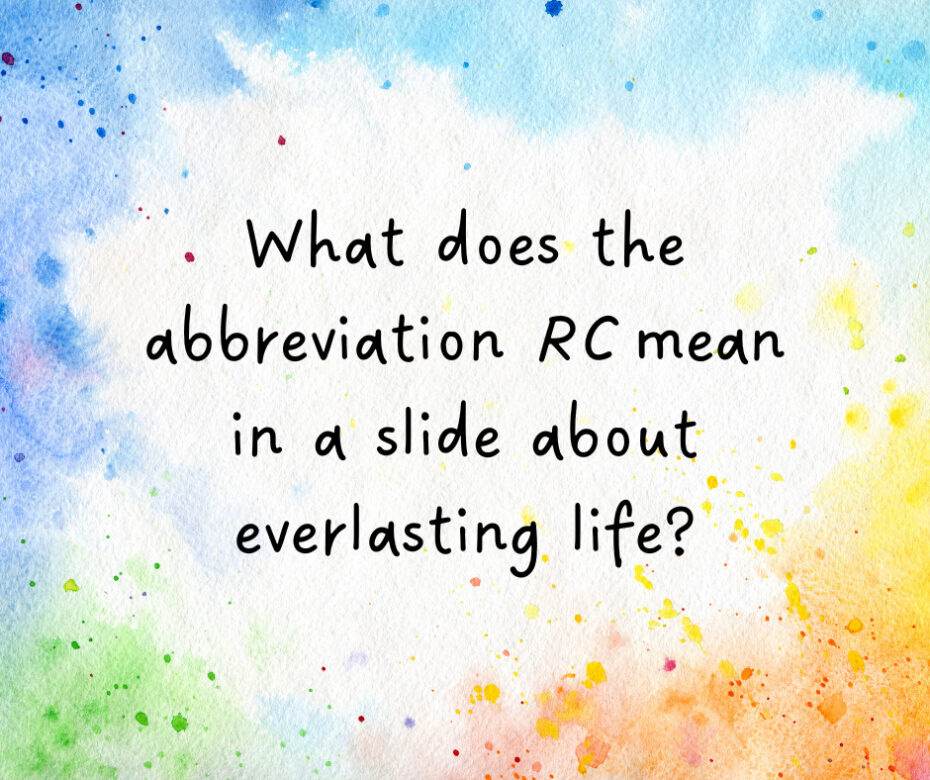Recently, my daughter, son-in-law, and I were looking at a slide that was part of a presentation by my friend at GES, Bob Wilkin. We were looking at it in preparation for a study he was going to go do on the word “salvation,” and Bob was not present at the time. His slides were easy to follow, until we got to a particular one. The slide read, “Their own testimony is that they believed OSAS years after RC.”
That abbreviation stumped me because it seemed out of place. I didn’t know what it meant. I had spent a large part of my life working with Catholics, and every time I had seen those two letters together, it always meant Roman Catholicism. I had to make some assumptions about that slide. I concluded that when Bob got to it, he was going to talk about somebody he knew who believed in Jesus for eternal life after a long time of being in the Roman Catholic Church. I was pretty sure that is what it meant.
I explained my reasoning to my daughter and her husband. My son-in-law suggested another interpretation. The “RC” stood for R. C. Sproul. Sproul was a very famous Reformed teacher who taught you could not know for sure you had eternal life since you had to persevere to the end of your life in good works to show that you were one of God’s elect. Nobody can be sure he or she is a part of that group of people God had chosen in eternity past to be saved from the lake of fire. My son-in-law said that Bob was going to talk about somebody who had been influenced by R. C. Sproul and Reformed theology but then believed in Jesus for eternal life and knew he or she had it. I had heard Bob talk about R. C. Sproul on occasion, so I thought that was a possibility. But I liked my interpretation better because RC was more commonly used for Roman Catholicism than Sproul.
My daughter gave a third interpretation. She said it means, “receiving Christ.” Bob was going to talk about somebody who claimed to have received Christ and been born again years before he believed in the promise of everlasting life. I told my daughter she was crazy. I was older than she was. I knew Bob better than she did. I had never heard anybody use “RC” in that way. I had known Bob for a long time and never saw him use RC as an abbreviation for that.
We live in a day and age when people would say it didn’t matter what RC meant. All three suggestions made sense, at least to some people. Truth is in the eye of the beholder. All three of us could all be right.
But all three of us knew that wasn’t the case. Truth exists. One of us was right, and the other two were wrong. Of course, there was another possibility. Bob could have meant something else, something none of us could figure out.
Fortunately, Bob later gave the presentation. We asked him what it meant. He said my daughter was right. Some people say that they received Christ (that is the terminology they use) and were born again years before they believed in once saved, always saved. (He was talking about people who do not believe that assurance is of the essence of saving faith.) It was a humbling experience for me, even though I still think Bob was using a dumb abbreviation.
In 2 Peter 3:15-16, Peter wrote about Paul. He said that in Paul’s letters there are things that are difficult to understand. Some, no doubt, are that way because of the backgrounds of the people reading them. I see Peter here admitting that when he read some of the things Paul wrote, he had to think about them. He had to ask others what Paul meant, and they discussed these matters. He may have even said that when he saw Paul the next time, he would find out.
I could not see RC standing for anything other than Roman Catholicism. It made it difficult for me to interpret Bob’s slide. I was not willing to listen to my daughter’s suggestion.
There is a lesson for us. We can learn from each other. Others may, in fact often do, have insight into the truths of God’s Word that we need because we can’t see it, for whatever reason. We need each other. God has placed us in the church to learn from each other. Let’s be humble as we recognize that fact and be open to what others can teach us in their words or actions. (I would only request that we not use abbreviations that are hard to understand.)


